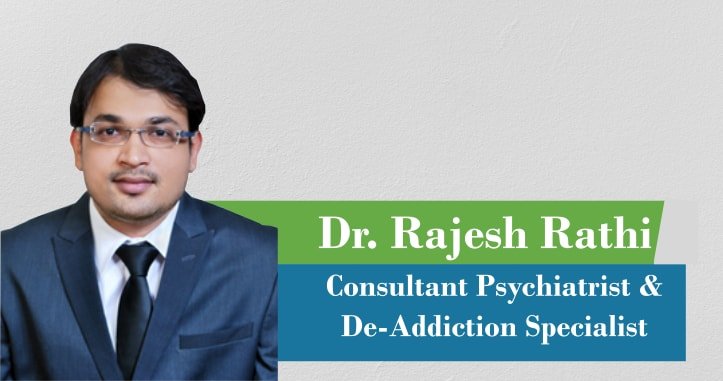
Meet Dr. Rajesh Rathi – Trusted Psychiatrist in Nagpur
If you are searching for a reliable and experienced Psychiatrist in Nagpur, Dr. Rajesh Rathi at Apex Clinic offers expert care for emotional, behavioural, and psychological concerns. With years of clinical experience and compassionate patient handling, he helps individuals overcome mental health challenges and regain emotional stability and confidence.
Why Mental Health Matters – Explained by a Psychiatrist in Nagpur
Mental health impacts how you think, behave, communicate, and manage daily responsibilities. When your emotional health is affected, even simple tasks may feel overwhelming. Although many people delay seeking help due to stigma or uncertainty, early treatment ensures faster and longer-lasting recovery.
With support from Dr. Rajesh Rathi at Apex Clinic Nagpur, patients experience improved clarity, emotional strength, and a healthier lifestyle approach.
Who Should Consult a Psychiatrist in Nagpur? Warning Signs to Notice
You may benefit from psychiatric support if you are facing:
- Persistent sadness, low mood, or hopelessness
- Excessive worry, panic attacks, or overthinking
- Sudden mood changes or emotional breakdowns
- Sleep problems, lack of focus, or forgetfulness
- Stress due to work, relationships, or life changes
- Addiction to alcohol, substances, gaming, or mobile
Although these symptoms may seem manageable at first, they can gradually impact relationships, career, and overall wellness. Seeking early help from Dr. Rajesh Rathi prevents complications and supports a healthier life.
Comprehensive Evaluation & Diagnosis at Apex Clinic Nagpur
To ensure accurate treatment, Dr. Rajesh Rathi conducts detailed assessments including psychological evaluations, clinical interviews, and medical history analysis. This step-by-step evaluation helps identify the root cause of emotional or behavioural challenges.
Because of this systematic method, patients receive the right diagnosis and treatment plan, ensuring clarity and confidence before beginning therapy.
Personalized Treatment Plans by Dr. Rajesh Rathi
Every patient has unique emotional and psychological needs. Therefore, treatment plans created by Dr. Rajesh Rathi are fully customized based on:
- Age
- Severity of symptoms
- Lifestyle
- Diagnosis
- Response to treatment
The primary aim is long-term stability, not just temporary relief. With personalized care, patients experience steady emotional improvement and better mental clarity.
Therapy & Counseling Services at Apex Clinic
To support complete mental wellness, Dr. Rajesh Rathi offers scientifically proven therapy methods, such as:
- CBT (Cognitive Behavioral Therapy)
- DBT (Dialectical Behaviour Therapy)
- REBT (Rational Emotive Behaviour Therapy)
- Mindfulness and relaxation-based therapy
- Family, marriage, and relationship counseling
These therapies help rewire negative thinking patterns, build healthy coping mechanisms, and strengthen emotional resilience.
Holistic Healing Approach – Mindfulness, Lifestyle & Emotional Balance
Along with clinical treatment, Dr. Rajesh Rathi encourages holistic practices including meditation, breathing exercises, sleep hygiene, nutritional awareness, and stress management habits. These lifestyle improvements support better emotional regulation, improved focus, and long-term mental well-being.
Transformation Stories with Dr. Rajesh Rathi
Over the years, many patients have successfully overcome depression, anxiety, OCD, childhood emotional issues, and behavioural disorders under Dr. Rathi’s care. Their progress highlights that recovery is always possible with proper guidance, patience, and treatment consistency.
Frequently Asked Questions (FAQ)
- 1. When should I consult Dr. Rajesh Rathi?
If emotional or psychological symptoms interfere with daily life, relationships, or work, it’s time to consult a psychiatrist. - 2. Will I need medication?
Not necessarily. Treatment may include counselling, therapy, lifestyle changes, or medication depending on your diagnosis. - 3. How long does treatment take?
Treatment duration varies because every case is different. Some patients improve in a few sessions, while others need long-term support. - 4. Are consultations confidential?
Yes, absolutely. All information shared with Dr. Rajesh Rathi at Apex Clinic remains strictly confidential. - 5. Does Dr. Rajesh Rathi offer online consultations?
Yes, online and offline appointments are available for convenience.
Your mental well-being matters. Whether you are struggling with mild emotional stress or a long-standing psychological condition, seeking help is a positive step toward healing.
